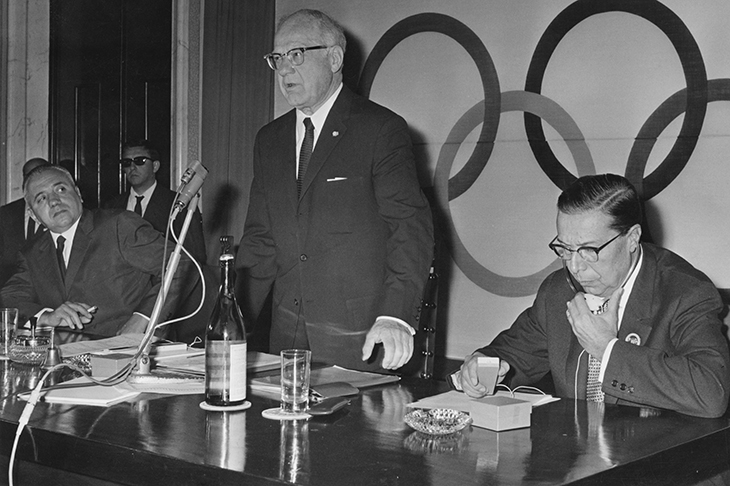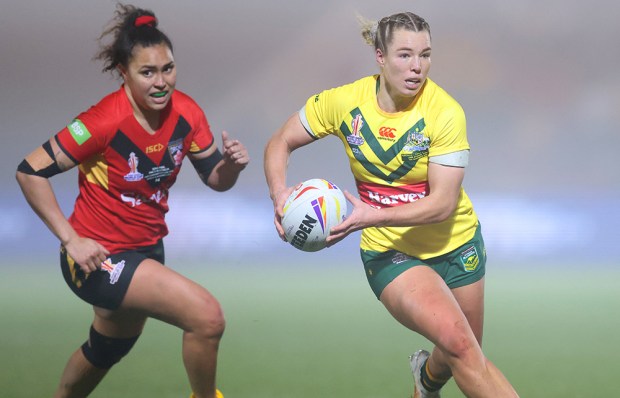Avery Brundage was known to his enemies as Avery Ice Age — and to quite a few of his friends too, I would imagine. He was a man of ‘dictatorial temperament’, according to one of his critics. A wealthy American, Brundage brought his ultra-conservative outlook to bear on the Olympics, which he bossed from 1952-72. He was, another critic said, bent on ‘insulating the Games from the meddlesome tentacles of the real world’.
He was particularly keen on the idea of amateurism, regardless (or maybe because) of the fact that the amateur ideal was the brainchild of the English aristocracy that ensured they didn’t have to compete against the lower orders. As far as old Ice Age was concerned you came from your lecture hall, office or hospital round, swapped your pinstripes for a pair of shorts and went out to have a crack at breaking the world record.
What he would have made of the spectacular brilliance of events in Tokyo at the moment, heaven alone knows. It is as far removed from what Brundage had in mind as a skateboard is from a penny-farthing bicycle.
Powerful cases were made on either side about whether the Games should go ahead against a background of rising Covid cases and deaths in Japan. But they have just got better and better, and no one can fail to be impressed by the determination and resilience of athletes who have trained in isolation and are now competing in these taxing circumstances. Their unflinching striving for excellence amid the encircling negativity makes us all awestruck. Maybe even old Ice Age would have melted at the spectacle.
It is almost impossible to pick out highlights amid such a feast: I have loved the joyous Fijians in the rugby sevens; Tom Daley (of course); all the parents celebrating wildly thousands of miles away in the middle of the night; the Cambridge–educated mathematician, Austria’s Anna Kiesenhofer, who was so far ahead in the gruelling women’s road race that the Dutch favourite in second place thought she had won; and if anyone tries to tell you the British youth are a bunch of screen-obsessed lay-abouts, just say ‘Charlotte Worthington’ to them. Doing a 360-degree backflip on a BMX, having just fallen off, her bike and body spinning in midair like a top, takes more bottle than all the Asahi beer in Japan.
Sports people outing themselves as suffering from mental health problems is turning from a trickle into a steady flow. The stiff-upper-lip brigade are harrumphing furiously about how in their day they used to grin and bear it. Not all of them. Some used to grin and kill themselves. Read David Frith’s haunting book, Silence of the Heart: Cricket Suicides, published 20 years ago. It is a riveting account of more than 100 players, including top names, who have taken their own lives. This is only one sport in which minuscule margins of error can make or break a player, but it’s hard to imagine cricketers’ psychological turmoil is not shared by those competing in other sports.
Here’s the truth about the Hundred: it’s great — for women’scricket. It’s the perfect format to engage young girls and grow the game. Like three sets in tennis slams, or shorter golf courses, women’s cricket can be slightly different. It’s not that easy to clear the boundary, so when the women do, it becomes really special. Their game is more about working the ball, fielding and throwing; intelligent cricket backed by quick thinking. It’s not simply about belting the ball into the next town. Let the men concentrate on Tests, counties and traditional formats; let the women loose on what is the biggest opportunity in sport.
Got something to add? Join the discussion and comment below.
Get 10 issues for just $10
Subscribe to The Spectator Australia today for the next 10 magazine issues, plus full online access, for just $10.
You might disagree with half of it, but you’ll enjoy reading all of it. Try your first month for free, then just $2 a week for the remainder of your first year.















Comments
Don't miss out
Join the conversation with other Spectator Australia readers. Subscribe to leave a comment.
SUBSCRIBEAlready a subscriber? Log in